
The Nobel Prize in Physiology or Medicine is awarded yearly by the Nobel Assembly at the Karolinska Institute for outstanding discoveries in physiology or medicine. The Nobel Prize is not a single prize, but five separate prizes that, according to Alfred Nobel's 1895 will, are awarded "to those who, during the preceding year, have conferred the greatest benefit to humankind". Nobel Prizes are awarded in the fields of Physics, Chemistry, Physiology or Medicine, Literature, and Peace.

The Karolinska Institute is a research-led medical university in Solna within the Stockholm urban area of Sweden. The Karolinska Institute is consistently ranked amongst the world's best medical schools, ranking 6th worldwide for medicine in 2021. The Nobel Assembly at the Karolinska Institute awards the Nobel Prize in Physiology or Medicine. The assembly consists of fifty professors from various medical disciplines at the university. The current rector of Karolinska Institute is Ole Petter Ottersen, who took office in August 2017.
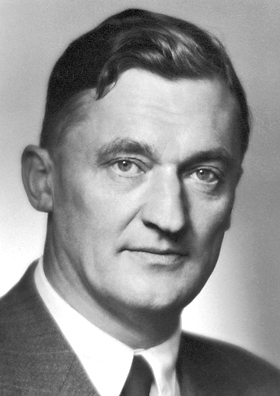
Axel Hugo Theodor Theorell was a Swedish scientist and Nobel Prize laureate in medicine.
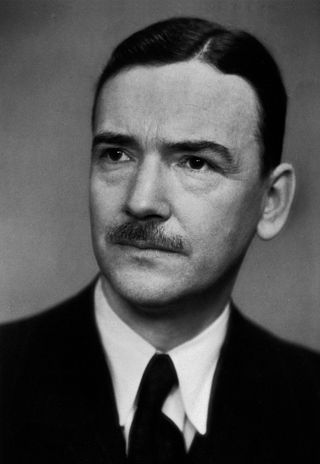
Ulf Svante von Euler was a Swedish physiologist and pharmacologist. He shared the Nobel Prize in Physiology or Medicine in 1970 for his work on neurotransmitters.

Frederick Chapman Robbins was an American pediatrician and virologist. He was born in Auburn, Alabama, and grew up in Columbia, Missouri, attending David H. Hickman High School.

The Johns Hopkins University School of Medicine (JHUSOM) is the medical school of Johns Hopkins University, a private research university in Baltimore, Maryland. Founded in 1893, the School of Medicine shares a campus with the Johns Hopkins Hospital and Johns Hopkins Children's Center, established in 1889. It has consistently ranked among the top medical schools in the United States in terms of the number/amount of research grants/funding awarded by the National Institutes of Health, among other measures.

A Nobel Committee is a working body responsible for most of the work involved in selecting Nobel Prize laureates. There are five Nobel Committees, one for each Nobel Prize.
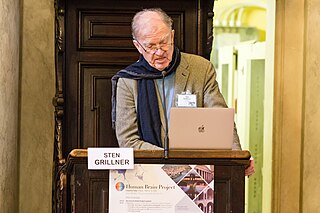
Sten Grillner is a Swedish neurophysiologist and distinguished professor at the Karolinska Institute's Nobel Institute for Neurophysiology in Stockholm where he is the director of that institute. He is considered one of the world’s foremost experts in the cellular bases of motor behaviour. His research is focused on understanding the cellular bases of motor behaviour; in particular, he has shown how neuronal circuits in the spine help control rhythmic movements, such as those needed for locomotion. He is current secretary general of International Brain Research Organization IBRO and President of the Federation of European Neuroscience Societies (FENS). For his work, in 2008 he was awarded the $1 million Kavli Prize for deciphering the basic mechanisms which govern the development and functioning of the networks of cells in the brain and spinal cord. This prize distinguish the recipient from the Nobel prizes in basic medical sciences.
Acta Paediatrica is a monthly peer-reviewed medical journal covering paediatrics. It is published by Wiley-Blackwell on behalf of the Foundation Acta Paediatrica, based at the Karolinska Institute in Sweden.
The Nobel Assembly at the Karolinska Institute is a body at Karolinska Institute which awards the Nobel Prize in Physiology or Medicine. It is headquartered in the Nobel Forum on the grounds of the Karolinska Institute campus. Originally the Nobel Assembly was not a formal body but rather the collective of all professors at Karolinska Institute. In 1977 the Nobel Assembly became a separate private organization hosted by Karolinska Institute. Until 1984 all Karolinska Institute professors belonged to the Assembly; from 1984 the membership is restricted to 50 Karolinska Institute professors.

Göran K. Hansson, is a Swedish physician and scientist.
The Nobel Committee for Physiology or Medicine is the Nobel Committee responsible for proposing laureates for the Nobel Prize for Physiology or Medicine. The Nobel Committee for Physiology or Medicine is appointed by the Nobel Assembly at Karolinska Institutet, a body of 50 members at Karolinska Institutet which is formally a separate body not part of the institute itself. It usually consists of Swedish professors of physiology or medical subjects active at Karolinska Institutet, although the Assembly in principle could appoint anyone to the committee. Other than the five ordinary members, ten associated members are appointed each year, for that year only.
Rolf Zetterström was a Swedish pediatrician. He was Professor of Pediatrics at the Karolinska Institute fra 1962 until his retirement in 1986. Zetterström also had a central role in the institutions awarding the Nobel Prize in Physiology or Medicine.
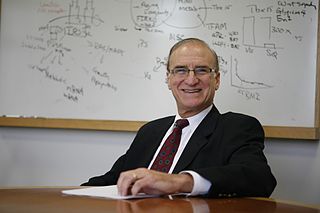
Carl Ronald Kahn is an American physician and scientist, best known for his work with insulin receptors and insulin resistance in diabetes and obesity. He is the Chief Academic Officer at Joslin Diabetes Center, the Mary K. Iacocca Professor of Medicine at Harvard Medical School and a member of the National Academy of Sciences since 1999.
Arvid Wallgren was a Swedish pediatrician. He was Professor of Pediatrics at the Karolinska Institute, a member of the Nobel Assembly at the Karolinska Institute and editor-in-chief of Acta Paediatrica from 1950 til 1964.

Rolf Thomas Perlmann, is a professor of molecular developmental biology at Karolinska Institute. In 2006, he became a member of the Nobel Assembly at the Karolinska Institute. He became an adjunct member of Karolinska Institutet's Nobel Committee in 2008 and was then elected in 2012. He has been Secretary for the Nobel Committee for Physiology or Medicine since 2016.

Rikard Holmdahl is a Swedish physician and immunologist. He was appointed as a full professor and the head of Medical Inflammation Research (MIR) unit at Lund University in 1993. In 2008, Rikard and his whole research group were recruited to Karolinska Institute. His team was the first to discover and positionally clone a single nucleotide polymorphism at the Ncf1 gene causing susceptibility to autoimmune diseases in rat models. Rikard was an adjunct member of the Nobel Committee for physiology or medicine between 2016 and 2021, and was ranked 2nd among the top immunology scientists in Sweden in 2021.
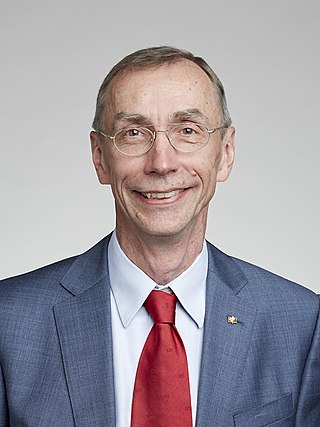
The 2022 Nobel Prize in Physiology or Medicine was awarded to the Swedish geneticist Svante Pääbo "for his research in the field of genomes of extinct hominins and human evolution". It was announced by Thomas Perlmann, secretary of the Nobel Assembly at Karolinska Institutet in Stockholm, Sweden, on 3 October 2022.













